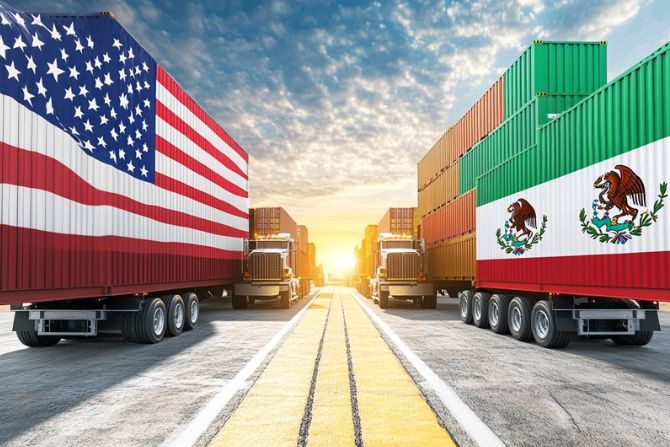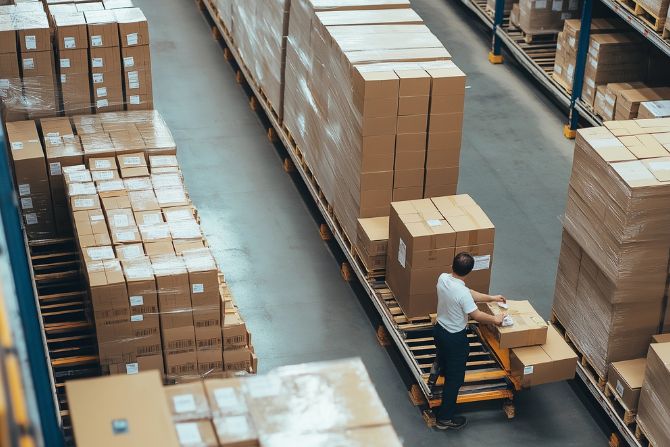
Freight brokerage is at the heart of efficient cross-border trade, especially when it comes to navigating the complexities of shipping to a highly regulated country like Mexico. Boasting a strategic location and a series of ports providing instant access to both the Pacific Ocean and the Gulf of Mexico, Mexico has emerged as the foremost shipping avenue to achieve business success in the North American region. Freight forwarding services are crucial in simplifying the shipping process from beginning to end and help you make the most of cross-border shipping opportunities. Delivering an average ROI of 3800%, freight forwarding isn’t just a smart investment – it’s a critical choice for companies seeking to gain a foothold in the Mexican market.
However, no two freight forwarders are the same; therefore, choosing the right partner with a strategic approach is important.
Table of Contents:
- Choosing the Right Freight Forwarding Partner for Shipping to Mexico
- Understanding Mexico’s Customs Process
- Optimizing Your Supply Chain for Efficient Cross-Border Shipping
- Navigating Cross-Border Challenges
- Value-Added Services Offered by Freight Forwarders in Mexico
- FAQs in Relation to Freight Forwarding Mexico
- Conclusion
Choosing the Right Freight Forwarding Partner for Shipping to Mexico
Shipping to Mexico is no mean feat it requires expertise in navigating customs regulations and maneuvering through logistics to ensure your goods arrive safe and sound. That requires selecting the right freight forwarder in order to overcome these challenges and optimize your cross-border operations.
Key Factors to Consider
An ideal freight forwarder should have:
- Extensive Knowledge of Mexican customs regulations, documentation requirements, and local logistics to prove all-round guidance.
- Offer a Comprehensive suite of Services from pickup to delivery, including value-added options such as warehousing, inventory management, and customs brokerage.
- Proven Track Record: of delivering expert logistics solutions tailored to the Mexican market.
With multiple freight forwarding options in the market, the key is to find a partner who best understands your supply chain needs and provide requisite support to ensure smooth, efficient operations.
Common Mistakes to Avoid When Choosing a Freight Forwarder
Selecting the wrong or to be more precise inexperienced forwarder can invite unnecessary trouble while being an additional burden on your budget and time.
Here are three critical mistakes to steer clear of:
- Focusing Solely on Cost: Price is no doubt a key concern but avoid falling into the trap of cheap options as this opens you up to hidden risks of inexperience or errors. A knowledgeable provider might come up with a high upfront cost but this will ultimately yield dividends for your business by preventing costly mistakes down the line.
- Lack of Clear Communication: Miscommunication can result in a glaring gap between your expectations and the services you receive. It’s therefore essential to communicate your logistics needs clearly and forthrightly to ensure more transparent solutions customized to your specific supply chain goals.
- Overlooking Customer Service: Responsive and proactive support as and when you need it is key to smooth-sailing and uninterrupted operations.
Choose a forwarder that prioritizes communication and collaborative relationships to offer the highest value to customers.
Understanding Mexico’s Customs Process
A preliminary step to successful cross-border shipping is clearing the customs within Mexico’s territory. Driven by a rapidly growing manufacturing sector and a boom in international trade, Moscow’s freight landscape presents both opportunities and challenges for prospective businesses eager to launch in the Mexican market. Mexico’s customs procedures involve two primary stages:
Pre-Clearance Requirements
This exhaustive process entails submitting detailed documentation to Mexican customs authorities for review and gaining their approval to enter your shipment.
Physical Inspection Procedures
Companies also undergo a rigorous inspection process beginning with a random passage through an automated system followed by a detailed inspection for certain high-risk or regulated products. Special procedures are also in place for sensitive items or controlled substances.
Additional Requirements
Apart from the above documents, businesses are also required to comply with labeling and packaging standards along with paying all duties and taxes right before customs clearance to avoid any glitches later on.
Brokers who fail to comply with these requirements are likely to face not only increased costs due to delayed processes but also incur the risk of penalties. Having a trusted provider on board streamlines this process to ensure that all documents are up-to-the-mark, accurate, and timely.
Required Documentation for Customs Clearance
Proper documentation is the backbone of a successful customs clearance process in Mexico. Missing or incomplete paperwork can lead to delays, fines, or even shipment rejections. Here are the key documents you’ll need:
- Commercial Invoice: Includes the details of the transaction, including product descriptions, values and HS codes.
- Packing List: A detailed breakdown of the shipment’s contents consistent with the information in the commercial invoice.
- Bill of Lading or Airway Bill: Acts as proof of shipment and includes transportation details.
- Certificate of Origin (if applicable): Verifies the origin of goods to obtain preferential duty treatment under trade agreements like USMCA.
- Import Permits or Licenses (if required): Authorizes the entry of restricted goods in case of highly regulated industries.
In addition to these, Mexico imposes specific requirements, such as:
- Labeling and Packaging Standards: Products must comply with Mexican norms to avoid delays.
- Duties and Taxes: All applicable fees must be calculated and paid prior to clearance.
A knowledgeable freight forwarder ensures all documentation complies with Mexico’s regulations, minimizing risks. They can also help you leverage trade agreements and duty drawbacks to reduce costs, making your supply chain more efficient.
Role of a Licensed Customs Broker
In Mexico, a customs broker (agente aduanal) acts as a crucial link between customs authorities and any business. These certified professionals serve to ensure that you comply with all legal and regulatory requirements to facilitate customs clearance for your goods a customs broker verifies and submits relevant documentation, such as invoices, packing lists, and permits along with calculating estimates of applicable duties and taxes to avoid unforeseen delays.
They are pivotal for customs clearance by maintaining high levels of accuracy in declaring the contents of shipments to Mexican customs authorities, hence preventing penalties or fines.
Last but not least, they keep up with evolving customs regulations to ensure regulatory compliance for your goods and products.
The last thing you would want is to get caught up in flawed customs processes or at worst non-compliance. That’s where a licensed customs bróker comes into play. Well-reputed freight forwarder like The ILS Company closely collaborate with experienced and authorized brokers to provide end-to-end solutions for cross-border shipping.

Licensed customs brokers streamline customs clearance, minimizing risks and delays.
Optimizing Your Supply Chain for Efficient Cross-Border Shipping
You can think of the logistics process as a complex maze involving a sequence of steps from transportation and warehousing to customs clearance.
The following 6 strategies can help streamline your supply chain.
Strategies for Efficiency
Streamlining cross-border logistics is essential to reduce costs, improve delivery times, and enhance supply chain reliability. Here are practical strategies to achieve efficiency:
- Leverage Technology:
- Modern technologies like advanced tracking systems provide real-time visibility to track the shipment process to help identify potential delays at the outset and make proactive adjustments.
- Access valuable data insights to make informed supply chain decisions.
- Consolidate Shipments:
- Combining smaller or isolated shipments into larger loads can be advantageous for industries dealing in high-volume goods or recurring orders for enhanced cost-efficiency.
- Utilize Bonded Warehouses or Foreign Trade Zones:
- o Defer duties and taxes by storing goods in bonded facilities until they’re ready for distribution.
- Implement Just-in-Time (JIT) Inventory Management:
- This is an effective cost management strategy that works by aligning inventory levels with customer demand.
- Collaborate with Stakeholders:
- o Work closely with local suppliers in key locations and leverage services of reputable freight forwarders with strong local networks to optimize production and delivery schedules.
- Strategic Warehousing:
- A strategic approach to warehousing involves reducing the distance between your inventory and key markets in Mexico to minimize transit times and improve delivery reliability.
Advanced tracking systems and logistics expertise allow businesses without local infrastructure to focus on core activities while maintaining excellent customer service.
In addition, working with a logistics partner, you can optimize your supply chain for smoother operations, allowing you to focus on your core business while they handle the complexities of cross-border shipping.
Strategic Location Selection
In cross-border shipping, the location of your warehouses and distribution centers are a key determinant of how fast your orders are delivered and overall shipping costs.
Take into account the following factors when selecting a site:
- Proximity to Customers:
- If your customer base is concentrated in northern Mexico, positioning your facility near the border allows shorter transportation routes and faster border crossings.
- For businesses serving a wider geographic area, a central location—such as near Mexico City—can provide greater outreach and efficiency.
- Industry-Specific Needs:
- Industries like automotive often benefit from proximity to manufacturing hubs in northern Mexico, while retail businesses may prioritize accessibility to major urban centers.
- Regulations and Infrastructure:
- Prefer locations with well-developed infrastructure, such as highways and ports, to streamline can streamline operations. Areas with robust compliance support marked by the presence of knowledgeable freight forwarders can bolster regulatory adherence for compliant operations.
Working with an experienced provider like the ILS Company ensures a strategic approach to location selection. We will analyze your supply chain, identify optimal facilities, and navigate regulatory challenges, helping you balance cost and efficiency.

Selecting strategic warehouse locations in Mexico reduces transit times and shipping costs.
Navigating Cross-Border Challenges
Engaging in Cross-border trade implies setting foot into a territory that’s not your home country and as such defined by a specific legal framework and unique cultural context. This can pose significant challenges for businesses that have just started or lack understanding of the shipping ecosystem in Mexico.
The 3 Main Cross-Border Challenges Mexico-USA
Here are some common challenges and how to overcome them:
- Customs Regulations and Documentation:
- Challenge: Mexico’s documentation requirements can be quite complex to handle where a single error can result in delays, fines, or shipment rejections.
- Solution: For high-level precision in documentation matters, implement comprehensive document management systems or collaborate with reliable freight forwarders associated with experienced customs brokers for risk-free and smooth transit.
- Language and Cultural Barriers:
- Challenge: Lack of fluency in English language can increase chances of miscommunication and thus potential errors.
- Solution: o This can be addressed by choosing a bilingual logistics provider who is well-versed in the nuances of English language which is crucial in translating key documents such as commercial invoices and packing lists. This ensures clear communication on both ends to effectively navigate localized differences and prevent misunderstandings from arising.
- Pro Tip: Translate essential documents, like commercial invoices and packing lists, to ensure clarity and compliance.
- Infrastructure Limitations:
- Challenge: Mexico’s transportation infrastructure is of variable quality particularly highways that are the dominant route for freight transport and congested ports that can affect delivery timelines. Not only do the weight and size regulations differ from the USA but there are additional requirements for specific permits and insurance.
- Solution: This can be rectified by partnering with a freight forwarder who is well-versed in local logistics to select the best routes and transportation modes to ensure the timely delivery of goods.
Mitigating Risk in International Trade
The domain of international trade is fraught with risks stemming.
International trade involves inherent risks, from supply chain disruptions and cargo damage to regulatory changes. Employing the right strategies can mitigate these risks and lead to effective and efficient cross-border logistics.
- Partner with a Freight Forwarder Experienced in Risk Management:
- Given that risk is inevitable, opt for a provider that specializes in risk management by offering contingency plans and facility of cargo insurance. This is necessary to be well-prepared in advance in the event of unforeseen events like port closures or transportation delays.
- Stay Informed on Regulatory and Geopolitical Changes:
- Supply chains are subject to evolving trade regulations and wider geopolitical changes that can have a disruptive effect on the normal course of operations.
- Work with a freight forwarder who stays ahead of these changes and offers continuous guidance to keep your operations compliant.
- Secure Clear Contracts and Documentation:
- A balanced contract that effectively balances the interests of all parties involved is paramount. Ensure your interests are well-protected in all contracts and shipping documentation to avoid legal complications in the future.
- Your freight forwarder can assist in drafting and reviewing these documents, minimizing potential disputes and misunderstandings.
- Adopt Proactive Planning:
- Anticipate potential disruptions by extending your lead time and preparing alternative routes or carriers.
- Use real-time tracking systems to identify issues beforehand and address them well in time before they become a liability.
Value-Added Services Offered by Freight Forwarders in Mexico
Beyond basic logistics, freight forwarding providers in Mexico offer a variety of value-added services designed to me specific industry needs for maximum operational efficiency. These advanced solutions are particularly valuable for industries requiring high precision and accuracy such as aerospace, healthcare, and automotive.
Key Value-Added Services Include:
- Temperature-Controlled Shipping
- Ensures perishable or sensitive goods, like pharmaceuticals and fresh produce, are transported under ideal conditions to maintain quality and comply with regulations.
- Inventory Management
- Advanced systems track inventory levels and product movements to generate up-to-date and accurate inventory turns, helping companies reduce carrying costs and avoid out-of-stock.
- Warehousing and Distribution
- Strategically located storage facilities provide services like cross-docking, order fulfillment, and just-in-time delivery to expedite operations.
- Packaging and Labeling Services
- Customized packaging solutions and accurate labeling ensure products are ready-made for instant distribution while adhering to regulatory standards.
- Customs Brokerage Support
- Expertise in navigating customs regulations and documentation helps streamline cross-border processes and avoid delays.
- E-commerce Logistics
- Tailored solutions for online businesses, including pick-and-pack services, returns management, and last-mile delivery to improve customer satisfaction.
By incorporating these services into their logistics operations, companies can increase efficiency and improve product integrity, to maintain a competitive edge in the market. Freight forwarders like The ILS Company specialize in providing custom-made solutions to assist companies in managing logistics demands seamlessly to fuel their business growth.

Value-added services, such as custom packaging, enhance supply chain efficiency.
Specialized Handling and White Glove Services
For shipments requiring extra care, specialized handling and white glove services provide tailored solutions to ensure goods are transported and delivered under perfect conditions. These services are particularly vital for industries such as aerospace, automotive, electronics, and healthcare, where precision and reliability are non-negotiable
These services may include:
- Climate-controlled transportation and storage
- Shock and vibration protection
- Dedicated equipment and personnel
- Real-time monitoring and tracking
- Installation and assembly services
When you’re dealing with fields like aerospace, automotive, electronics, and healthcare, having that extra touch in handling – we’re talking white glove services here – really makes a world of difference. Handling sensitive goods with care can slash the risks of damage, delays, and other wallet-draining problems.
Temperature-Controlled Shipping Solutions
Temperature-controlled shipping solutions are critical for products that thrive in precise temperature environments such as pharmaceuticals, perishable foods, and chemicals. These specialized services aim to protect product quality and fulfill regulatory requirements to minimize losses due to spoilage or damage.
Key Features of Temperature-Controlled Shipping:
- Refrigerated containers and trailers
- Insulated packaging and gel packs
- Temperature monitoring and reporting
- Pre-cooling and cold storage facilities
- Expedited shipping options
By partnering with a logistics provider conversant in temperature-controlled shipping, businesses can safeguard their products and prevent cost-related issues caused by temperature fluctuations and thus stringently abide by strict quality and safety standards.

Temperature-controlled shipping ensures the safe transportation of perishable goods, maintaining product integrity throughout the supply chain.
Warehouse Management and Inventory Control
Effective warehouse management and inventory control are critical for businesses with cross-border supply chains. This includes a range of services including:
- Receiving and inspection of goods
- Inventory tracking and reporting
- Order processing and fulfillment
- Kitting and assembly
- Returns management
Handling these tasks requires expertise which makes a freight forwarder indispensable to ensure your warehouse and inventory management are well-managed. Outsourcing these tasks to a trusted freight forwarder like ILS can provide much-needed visibility and control over your warehouse operations to reduce excess costs and bring about quick inventory turn-over to effectively meet customer demands.

✐ Key Takeaway:
Selecting the right freight forwarder is essential for successful shipping to Mexico. Look for a partner with proven experience, a strong reputation, and advanced technological capabilities. They should have a thorough understanding of Mexican customs regulations and offer comprehensive solutions from pickup to final delivery.
While cost is a factor, prioritize quality service. Clear communication, proactive customer support, and customized solutions are critical to avoiding common mistakes and ensuring seamless operations.
FAQs in Relation to Freight Forwarding Mexico
Which country is best for freight forwarding?
It depends on your needs, but for trade with Mexico, the US stands out due to its proximity and extensive trade agreements, while China leads in manufacturing and global shipping networks
What do I need to haul freight into Mexico?
You’ll need proper documentation such as a Bill of Lading, commercial invoice, and if applicable, a USMCA certificate. Additionally, ensure compliance with Mexican customs regulations and consider hiring a customs broker for a smoother process.
What are the benefits of using a freight forwarder?
Freight forwarders streamline the shipping process by managing logistics, ensuring compliance with trade laws, and providing cost-effective solutions for transportation and customs clearance.
What are the main challenges when forwarding freight to Mexico?
Some challenges include navigating customs regulations, ensuring proper documentation, and coordinating cross-border logistics. Working with a reliable freight forwarder simplifies these processes.
Conclusion
Success in a dynamic market like Mexico requires an in-depth understanding of how the local market works and a meticulous approach to logistics complexities. Despite challenges, Mexico offers lucrative opportunities for businesses looking to tap into its expansive freight-forwarding landscape. A strategic partnership with an experienced logistics provider like ILS can provide you with a solid foundation to build sustainable logistics operations in a global trading hub like Mexico. At ILS, we combine local knowledge of customs with global best practices to ensure optimum and unimpeded logistics processes for your guaranteed success. Whether you are a newcomer to the logistics industry or a thriving entity, we are dedicated to be your trusted partners and guide in navigating the complexities of customs management.


